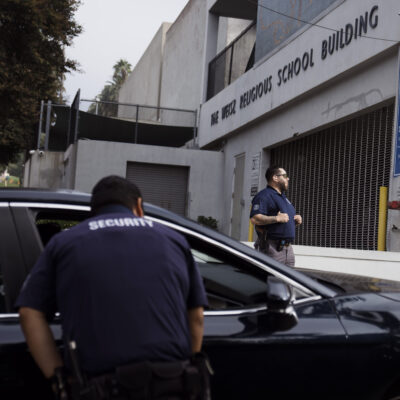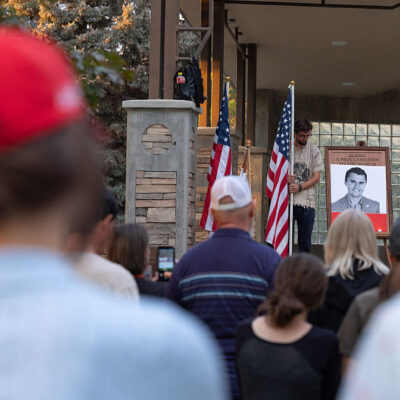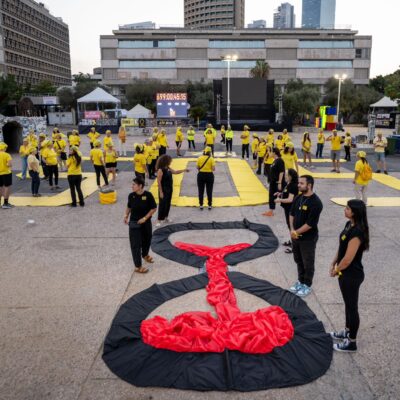Your Daily Phil: In the ruins of a Bat Yam neighborhood hit by Iranian fire
Good Thursday morning.
In today’s edition of Your Daily Phil, we visit the scene of a deadly Iranian missile strike in the Tel Aviv suburb of Bat Yam to cover the response by the American Jewish Joint Distribution Committee. We report on a World Jewish Congress delegation to Washington and on a similar mission to the District led by the Jewish Federations of North America and the Conference of Presidents, which heard from the father of one of the victims of last month’s Capital Jewish Museum shooting. We feature an opinion piece by Stephen D. Smith encouraging funders and nonprofits to move away from duplicating each other’s efforts, and one by Shuki Taylor with solutions for educators and institutional leaders walking on eggshells over how to teach and talk about the Israeli-Palestinian conflict. Also in this issue: Sarah Morris, David and Nicole Tepper and Linda Yarden.
What We’re Watching
The Conference of Presidents of Major American Jewish Organizations and the Jewish Federations of North America conclude their two-day leadership fly-in to Washington today.
The March on Washington for Jewish Civil Rights will be held this afternoon in Washington in memory of Yaron Lischinsky and Sarah Milgrim, who were killed in a shooting at the Capital Jewish Museum last month.
The Aspen Ideas Festival continues today, with a panel on the role of religion featuring “Chutzpod” host Shira Stutman, alongside Krista Tippett, David DeSteno and Gregory Boyle.
Boston’s Combined Jewish Philanthropies is hosting an online briefing about the situation in Israel between its president and CEO, Rabbi Marc Baker; Col. (res.) Miri Eisin, a former top Israeli Military Intelligence officer; and Daniel Silverberg, who co-leads the national security team of the global strategy firm Capstone.
What You Should Know
A QUICK WORD WITH EJP’S JUDAH ARI GROSS
Concrete dust still clings to cars on streets hundreds of yards away from where the Iranian ballistic missile struck, their windows shattered. Buildings are pocked with broken windows and mangled shutters, some with gaping holes where a wall used to be. At the center of the strike, one side of the 10-story apartment building has been shaved off and reduced to a pile of concrete and metal. Yet the whole side of the building where the safe rooms are located remains intact. Complete walls of surrounding buildings have been blown off, and the ground below is littered with debris from the wreckage. A gas station mere yards away was left unscathed — a reminder of how much worse the damage could have been.
These 7,500 square feet of destruction are what remain a week and a half after the missile attack — the deadliest of the 12-day Israel-Iran war, which killed 10 people and injured scores more — in the middle of a quiet residential neighborhood in the beachside Tel Aviv suburb of Bat Yam, reports eJewishPhilanthropy’s Judith Sudilovsky.
In total, 20 buildings will need to be demolished and rebuilt, while another 60 in various stages of destruction have been deemed structurally sound, though they will require extensive repairs to make them livable again.
A few residents of the neighborhood, brought by municipal bus from the hotel where they were evacuated, arrived in a daze to the blast site on Tuesday, walking toward what were once their homes to salvage what belongings they could. They were only permitted to collect 20 kilograms (44 pounds) worth of items for safety reasons, explained Rinat Gabai, Bat Yam’s emergency response manager, on a recent visit to the site with American Jewish Joint Distribution Committee field coordinator Yael Ben Nun and Ran Rovner, JDC-Israel director of marketing and organizational knowledge.
Gabai now faces the challenge of assisting some 800 families with diverse needs — from a reserve soldier who returned from Gaza to find his home destroyed, to elderly Russian-speaking immigrants, at-risk families and people with disabilities. Some residents have chosen to stay in their damaged homes, complicating outreach to them by the welfare department, she said. As there are no suitable hotels in Bat Yam, residents have been evacuated to hotels in Tel Aviv and Jerusalem, making it more difficult for the city’s welfare department to reach them, she added.
They have received many donations from well-meaning organizations, she said, but it was Ben Nun of JDC who asked the important question: What do you need?
“[Yael] knew to ask the question, which gave me a second to reflect on what it is that we need,” said Gabai. “Because to say what I need today, when everyone is really with us, [is one thing]. But the question is, will they be with us tomorrow, because here we need partners for the long term. This will be a long story. In the end, it is not just the rebuilding; we also have to create a community infrastructure here. This is something that the civil society can do faster than the municipality.”
Bat Yam is among the four cities receiving a total of $650,000 in a targeted multi-pronged emergency aid initiative including flexible funding, humanitarian aid, medical and rescue equipment and trainings and community care workers from the JDC following the missile attacks since the war with Iran began June 13, which left 28 dead — including 10 in Bat Yam. The aid effort focuses on vulnerable populations in Tamra, Bat Yam, Bnei Brak and Beersheva, which was added after a missile strike on Tuesday — just before the ceasefire — killed four people in a direct hit on a residential building.
Funding for the initiative is expected to expand soon, said Rovner. So far since June 13, JDC has raised a total of $3.7 million (NIS 12.5 million) for its emergency efforts, he added. Much of the funding was provided by the Jewish Federations of North America, as well as additional Jewish federations — UJA-Federation of New York, Jewish Federation of Greater MetroWest (N.J.), Jewish Nevada and the Jewish Federation of San Diego, along with private foundations and individual donors worldwide.
The Bat Yam neighborhood was home to numerous vulnerable populations already before the attack, Avital Rosenberger, JDC-Israel’s humanitarian operation director, told eJP. Now the challenges those affected by the missile attack face has been made worse by the loss of lives and property, and increasing trauma and new population groups also have become vulnerable.
“It’s like a double punch,” Rosenberger said. “There are a lot of new vulnerable populations that we have to get to know now and understand what the new needs are. It is like rebuilding the system.”
GOING GLOBAL
During D.C. visit, WJC urges increased U.S. action on international antisemitism

As a ceasefire in Israel’s conflict with Iran took effect on Tuesday, a delegation from the World Jewish Congress concluded its trip to Washington to discuss the international rise in antisemitism with lawmakers. “The whole world is watching what the American administration does,” Sara Friedman, executive director of WJC North America, told eJewishPhilanthropy’s Nira Dayanim. “Our Jewish communities around the world are looking for us to help them in this respect.”
Lead by example: The trip, which was planned in March, brought 15 representatives from Canada, the United States, Mexico and Europe to Washington. Led by J. Philip Rosen, WJC’s chair, the delegation held meetings with the Office of the Special Envoy to Monitor and Combat Antisemitism and other State Department officials, as well as White House Jewish liaison Martin Marks, Rep. Elise Stefanik (R-NY), Rep. Dan Goldman (D-NY) and Rep. Maria Elvira Salazar (R-FL). According to Friedman, the Trump administration has been “committed” to combating antisemitism domestically, but the delegation wants to see a stronger focus internationally. “America is a center of power and does lead by example, and we need that example to be stronger. And that’s the message that we kept just driving home,” she said.
BETTER PROTECTION
More security may have prevented the Capital Jewish Museum shooting, Sarah Milgrim’s father tells leaders

Bob Milgrim, the father of Sarah Milgrim, one of two Israeli Embassy employees who were killed last month at the Capital Jewish Museum, told Jewish leaders on Wednesday that better security at the event where his daughter was slain might have prevented the attack. “Had there been more security at the event where Sarah and Yaron [Lischinsky] were tragically murdered, had there been more security outside, watching the crowd, I feel that it possibly could have identified the shooter pacing back and forth and possibly disarmed him,” Milgrim told an audience of Jewish Federations of North America and Conference of Presidents of Major American Jewish Organizations leaders visiting Washington to advocate for increased security funding and other security resources to protect the Jewish community, reports Marc Rod for eJewishPhilanthropy’s sister publication Jewish Insider.
As much as possible: Milgrim added that a heavy police presence was necessary when his family was sitting shiva in Kansas following his daughter’s death, including police cars parked in front of the family’s home and a SWAT team a few blocks away. “It’s unbelievable,” Milgrim said. He noted that his local Jewish community had been targeted in an antisemitic shooting years earlier, in the 2014 attack at the Jewish Community Center in Overland Park, Kan. He urged Jewish leaders to call for “as much security as possible at all events,” including armed security and a visible police presence.
Read the full report here and sign up for Jewish Insider’s Daily Kickoff here.
Bonus: Sen. James Lankford (R-OK), one of the leading Senate advocates for the Nonprofit Security Grant Program, told Jewish leaders on Wednesday that he is working with administration officials to ensure that NSGP funding moves forward quickly, but acknowledged that it had already taken too long, reports Jewish Insider’s Marc Rod.
READER RESPONDS
After the call for unity, now what?: A response from the grant-seeking side

“Last month, respected leaders from across the organized Jewish world signed a public call for unity, published in eJewishPhilanthopy (‘Let’s stop the infighting: A call for unity,’ May 27). Their message was timely and necessary,” writes Stephen D. Smith, CEO of Memory Workers and executive director emeritus of USC Shoah Foundation, in an opinion piece for eJewishPhilanthropy. “I have been in the Jewish nonprofit world for more than three decades and will now echo that call for unity, reimagining possibilities for nonprofits to use the finite financial resources and scarce human capital more strategically and for greater impact.”
Real talk: “The uncomfortable truth? Too many Jewish nonprofit organizations are duplicating each other’s efforts… If you lead a legacy organization, try to reimagine how your considerable infrastructure could support new initiatives, reward innovation and partnership, increase impact and reduce burnout. If you lead a small organization, if your impact is hard to quantify, or if you’re fundraising just to stay afloat — I urge you to rethink. It is not a failure to join forces with a competitor. It is not a weakness to close a program if your skills can be better used elsewhere. And if you are a funder, you may not realize just how much precious time nonprofits expend on you — and a hundred other organizations just like you.”
TIME TO ARTICULATE
From ambiguity to clarity: The need Israel education must confront now

“Earlier this month, Lisa Eisen, co-president of Charles and Lynn Schusterman Family Philanthropies, published an article in eJewishPhilanthropy featuring six recommendations from thoughtful colleagues on how to catalyze a new era in Israel education,” writes Shuki Taylor, founder and CEO of M²: The Institute for Experiential Jewish Education, in an opinion piece for eJewishPhilanthropy. “One of the recommendations in the article came from me; Lisa invited me to offer, in her words, ‘one top suggestion for how we evolve Israel education to meet this moment in Jewish and American life.’ After sending her my response, however, I realized that this question deserved a fuller answer.”
Two complementary interventions: “In this charged environment, many Israel educators find themselves paralyzed by uncertainty. They don’t know what’s safe to say. … First, institutions need a structured process to define where they stand. This doesn’t mean every school, camp or synagogue needs to adopt the same position on Israel. What it does mean is that each organization should engage in a thoughtful, facilitated process — whether through surveys, coaching, or diagnostic tools — to clarify their own red lines, articulate their educational values and make those boundaries transparent to their staff… Second, educators need support in regaining the ability to articulate conviction, especially in complex environments. This is an identity-based task, not a policy one. It requires those of us in the field of Jewish education — teachers, mentors, trainers, and leaders — to ask: What do we stand for as Jewish educators? What are the values and commitments that animate our work? And what are we willing to prioritize, even when it’s uncomfortable?”
Worthy Reads
The Power of Asking Why: In the Stanford Social Innovation Review, Daniela Papi-Thornton shares a simple exercise she uses with teams of all sizes, with powerful results. “When I teach systems-led leadership to students, organizational leaders, and budding social entrepreneurs, I sometimes take them through a ‘triple why’ activity as a means of surfacing values, root causes, and barriers to their goals. This process takes inspiration from the ‘five whys’ process developed in the 1930s by Sakichi Toyoda as a means of identifying the root cause of mechanical issues. It takes that root cause usage and spreads that line of questioning into different areas: Why do you care about something, why is something happening, and why hasn’t it been solved yet? You could ask the ‘whys’ three times, five times, two times, 12 times — it’s really up to you! The process is not designed to get to perfect answers but instead to drive future learning and to spark conversations about overlooked assumptions or priorities… By digging deeper into the internal systems of our organizations or the wider systems of our world, we can identify what levers might be possible to contribute to change.” [SSIR]
Sounds of Silence: In The Colorado Sun, Sarah Morris laments the silence that met the firebombing attack on the Boulder, Colo., hostage solidarity march earlier this month. “In a necessary moment of condemnation from many, but not enough, civic leaders here in Colorado, the Boulder City Council issued a statement: ‘We … acknowledge in the strongest possible terms that this was a targeted, antisemitic attack.’ That line made me stop — not because it was radical, because it was the bare minimum, and it felt groundbreaking. That’s how low the bar is for Jewish safety in America: Simply naming an attack as harmful to Jews is a bold political stand. … As a queer woman — who marched, donated, organized in progressive spaces — the silence is painful. Friends and collaborators disappear. Not out of malice, I think, but fear: of saying the wrong thing, of being misunderstood. I get it. Dialogue is hard. … The Middle East shouldn’t affect your ability to be outraged that someone set Jews on fire for existing. Mourn with us. No caveats. [ColoradoSun]
Word on the Street
Attorney General Pam Bondi said on Wednesday that the Department of Justice was keeping a close eye on potential homeland threats to the Jewish community that may be motivated by the American and Israeli military strikes on Iran, report Jewish Insider’s Emily Jacobs and Marc Rod…
The Justice Department charged the man accused of firebombing a hostage-awareness rally in Boulder, Colo., last month with committing hate crimes…
Health Secretary Robert F. Kennedy Jr. announced yesterday that the United States would no longer support Gavi, the Vaccine Alliance…
California lawmakers agreed on a state budget that will include $14.5 million for the Holocaust Survivor Assistance Program, in a move hailed by the Jewish Public Affairs Committee of California; the organization also noted the approval of $80 million for the state’s nonprofit security grant program and $10 million for Los Angeles’ Museum of Tolerance, along with other Jewish communal priorities…
The Bosnian government apologized to the Conference of European Rabbis after a hotel in the country that was meant to host the organization’s annual gathering canceled the booking after receiving a letter from a federal minister stating that it “must not be a stage for supporting genocide”…
The World Jewish Restitution Organization has hired the Mayer Brown lobbying firm to help it push for legislation making it easier for Jewish families to recover artwork looted by Nazis…
Goldsmiths College issued an apology to Jewish students and faculty for having allowed a “culture” of antisemitism to permeate the London university in recent years…
British Jewish doctors reported feeling “intimidated, unsafe and excluded” at the annual conference of the British Medical Association, in which a disproportionately large number of motions were proposed related to Israel and Jews…
The Jewish Federation of Detroit raised a record high $38.8 million in its 2025 annual campaign, which concluded last month…
The Brooklyn Nets selected Israeli-American basketball players Danny Wolf and Ben Saraf in the first round of Wednesday night’s NBA draft…
Major Gifts
The David and Nicole Tepper Foundation announced more than $10 million in grants for food banks across North and South Carolina in the largest single commitment in the foundation’s history…
Transitions
Linda Yarden was named the next president of the Jewish women philanthropic organization Elluminate, succeeding Stephanie Garry, with her two-year term beginning July 1…
Pic of the Day
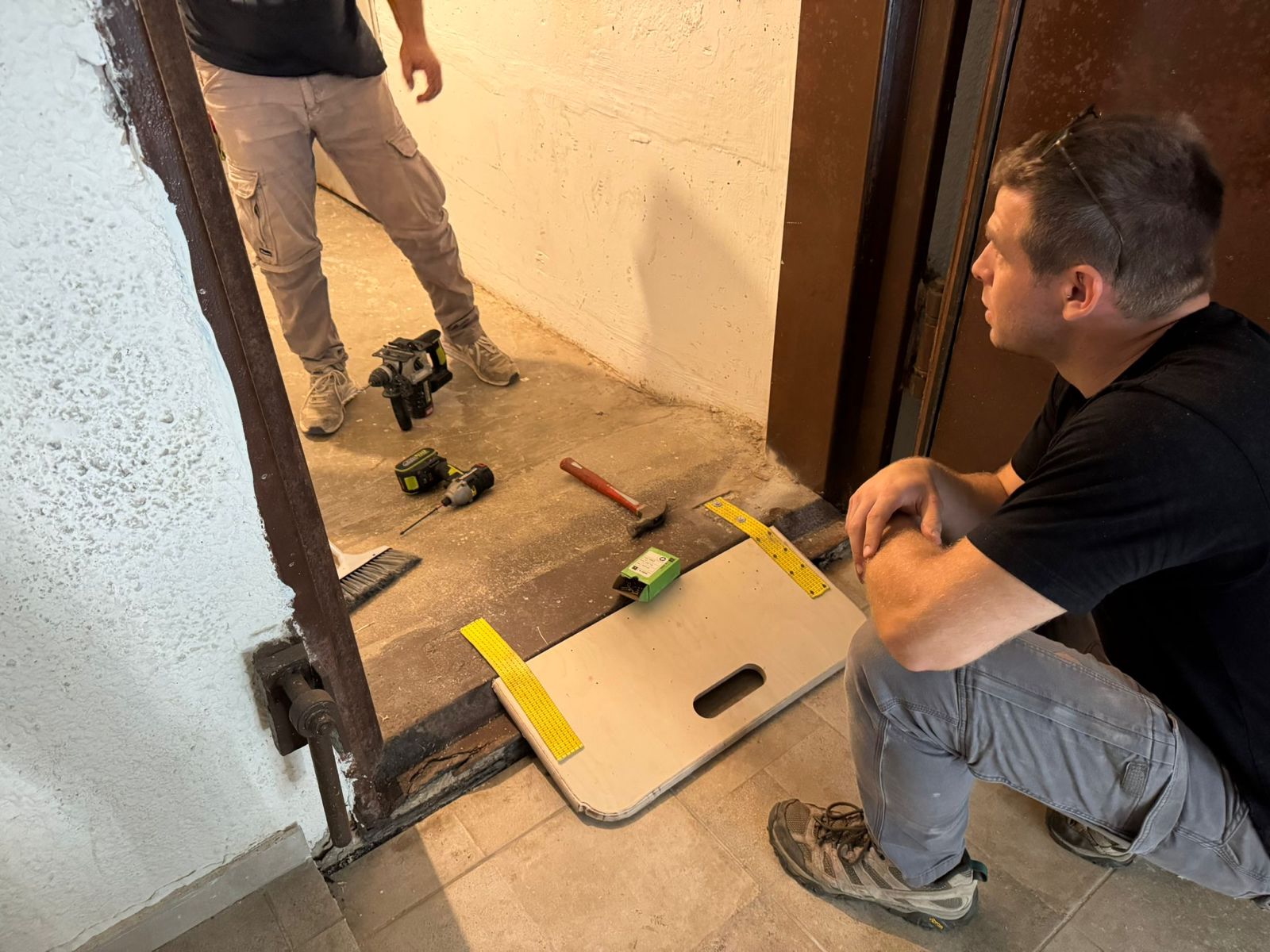
Volunteers from the Israeli disability inclusion nonprofit Tikkun Olam Makers install a movable ramp into an Israeli bomb shelter earlier this month to make it easier for people in wheelchairs to get to safety in case of attack. The organization, which creates open-source plans for accessibility-related products, says it has received 103 requests as of yesterday to retrofit bomb shelters to make them more accessible for people in Israel with disabilities.
Birthdays
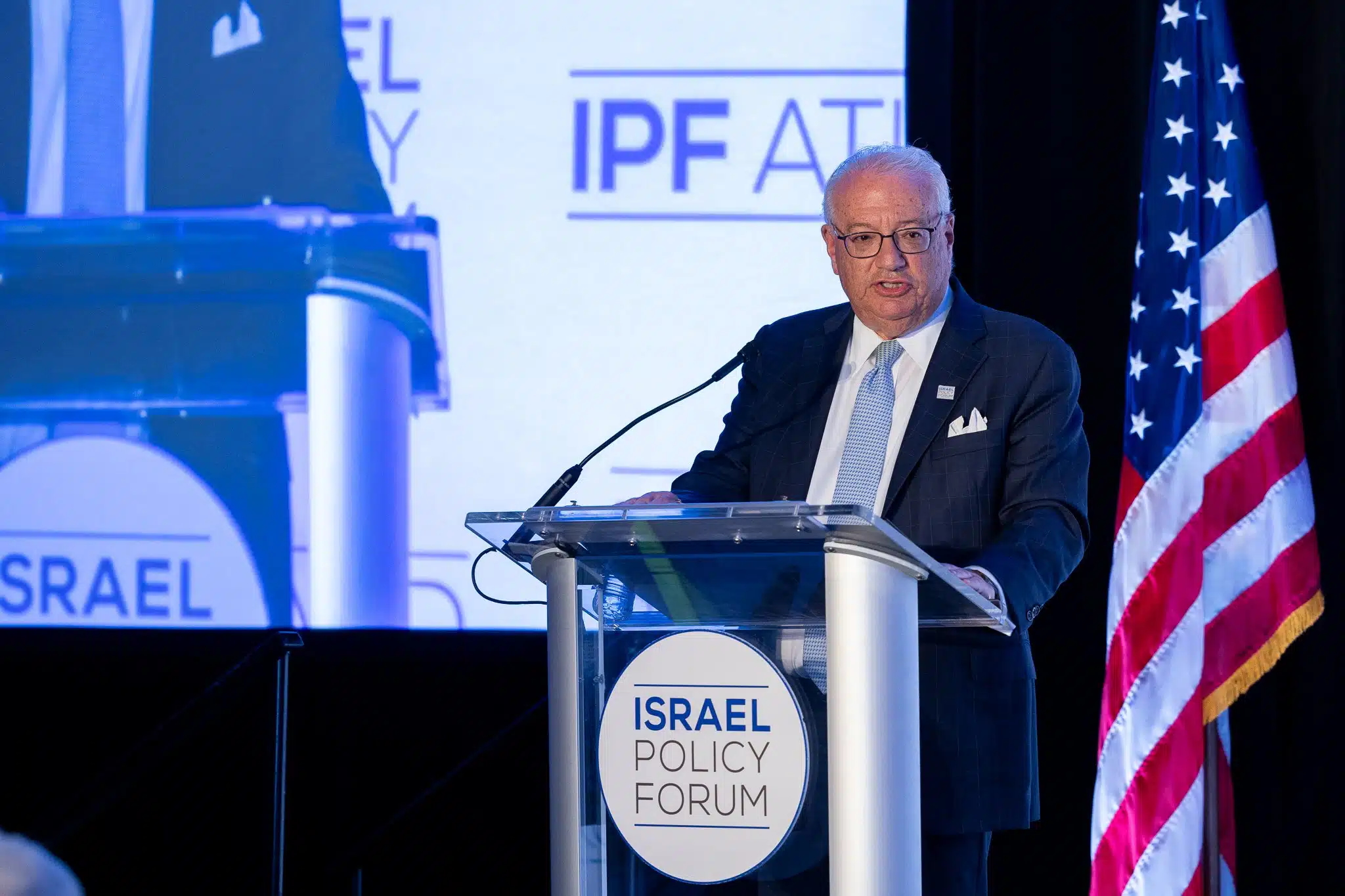
Founder of Grover Strategies, he was previously chairman of the Conference of Presidents of Major American Jewish Organizations, Alan Solow…
Artist known for his Expressionist paintings, Jonah Kinigstein turns 102… British Labour party member of Parliament for 42 years ending in 2017, David Winnick turns 92… Member of the New York State Senate from Queens since 1999, she chairs the committee on higher education, Toby Ann Stavisky turns 86… Partner in the law firm BakerHostetler, known for his recovery of $14.5 billion from the Madoff investment scandal, Irving H. Picard turns 84… Retired co-host for more than 30 years of NPR’s “All Things Considered,” Robert Siegel turns 78… Rabbi of Congregation Chaverim in Tucson, Ariz., for more than 35 years, Stephanie Aaron… CEO of Emerging Star Capital and the author of a biography of President Bill Clinton, Robert E. Levin… Attorney and Holocaust survivors’ rights advocate, Samuel J. Dubbin… CEO of ZMC, he was previously chairman of CBS and CEO of 20th Century Fox, Strauss Zelnick turns 68… Professor of psychology at Loyola University Maryland, she is known for her work on sleep patterns and behavioral well-being, Amy Ruth Wolfson, Ph.D…. Israeli actress and comedian, Anat Waxman… Once the wealthiest of all Russian businessmen, then a prisoner in Russia and now living in London, Mikhail Khodorkovsky… First Jewish federal cabinet member to serve in post-WWII Germany, she is minister for education, family, seniors, women and youth, Karin Prien… Novelist and journalist, most notable as the author of the Magicians trilogy, Lev Grossman… and his twin brother, author, video game designer and adjunct instructor at NYU, Austin Grossman… Former dean of Yeshiva University’s Sy Syms School of Business, now head of school at Ramaz, Noam T. Wasserman turns 56… President and founder of Reut Group, Gidi Grinstein turns 55… Political commentator, YouTube personality, comedian and talk show host, Dave Rubin… Head of external communications at Geico, Ross Feinstein… Partner since January in Mayer Brown’s D.C. office, Michael “Mickey” Leibner… Vice president of Israel and Jewish affairs at the Jewish Community Relations Council of New York, Sara Fredman Aeder… Executive director at the Jewish Public Affairs Committee of California, David Bocarsly… Project leader at Boston Consulting Group, Asher J. Mayerson… Author and former RNC national spokesperson, Elizabeth Pipko…


 Add EJP on Google
Add EJP on Google